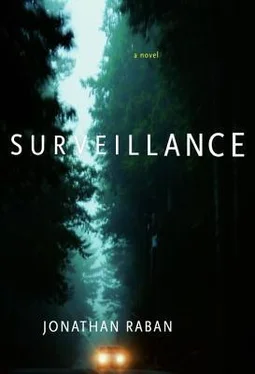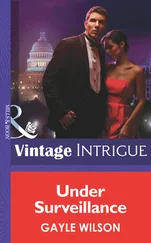Since Michael’s death six years ago, more and more of Tad’s time had been spent like this, afloat in the virtual counterworld, a community of people hidden behind pseudonyms who’d never met one another face-to-face. The virtual suited him. Untroubled by libido, he thought of himself now as postsexual, almost disembodied, as if each day brought a measurable lessening of his specific gravity in the actual world. Soon he’d be walking on air.
Playing stepfather to Ali was his last intimate human connection. Described in his will as “the sanest, most thoughtful human being I’ve ever met,” she was Tad’s sole heir. Only the attorney who’d witnessed his signature knew this.
He meant to leave her a cool million, not a dollar less; so it was for Ali that he went on working, swallowing both pride and principles to star in the terror shows, to be Mr. Autoglass, the MagiGro gardener, the light relief at hideous convention dinners. He wanted to see his mother’s money at last do some real good. In the sleepless small hours, sprawled diagonally across the king bed he’d once shared with Michael, Tad liked to picture Ali at Yale, Ali kitted out in surgeon’s scrubs, Ali at the podium in a packed lecture hall, Ali pith-helmeted in Africa — her career and costume changing from night to night. Ali’s future was another kind of virtual reality in which Tad found solace. He even relished his own necessary absence from these pictures; the not-being-there was part of their allure, like sitting in a darkened auditorium, magically freed from oneself by the more compelling and luminous life on the stage.
Ali, who could recite the value of  to the thirty-seventh decimal place, but was considerably prouder of her double-jointed elbows.
to the thirty-seventh decimal place, but was considerably prouder of her double-jointed elbows.
Ali, who took better care of her mother than her mother took care of her.
Ali, who was his sternest drama critic. “Is he really meant to be that much like Scrooge?” she’d asked doubtfully of his Shylock at the first dress rehearsal of Merchant at the Rep. She was dead right, and in the nick of time. Hastily but thoroughly de-Scrooged, Shylock got near rapturous notices in the Times and the P-I, all thanks to Ali.
Ali, the brave but comically graceless in-line skater.
Ali as the Wicked Witch of the West at Halloween. At age eight, she had Margaret Hamilton’s voice and delivery to an eerie “t.”
Ali.
It wasn’t light of my life, fire of my loins, but for Tad it headed distinctly, even dangerously, in that direction. He couldn’t take his eyes off Ali when she folded her arms across her chest to hide her nascent breasts — so boy, so girl, so girl-boy.
When he thought of Ali and her life to come, Tad had in clear view the threshold on which he himself would have to stand — not now, not yet, but some time sooner rather than later. When Michael went into the hospice three weeks before he died, Tad had seen the whitewashed brick mansion as a Greek house, a fraternity in which each new pledge went through a ritual hazing. As a college freshman, Tad had joined Phi Delta, knocking off the required quart of Jack Daniel’s before stripping naked and walking blindfolded on broken glass; thirty-five years later, he could still hear the frat boys’ whooping laughter as he trod that bloody path. And so it was with Michael, enduring the relentless, patient smiles of the staff as they put his incredible shrinking body on an IV drip, shot him full of morphine, wrapped and pinned him in diapers.
Death itself didn’t scare Tad. All he feared was the indignity of the initiation ceremonies that he’d have to go through to become a member of that enormous, nonexclusive, admirably egalitarian club. He envied people with dicey hearts: one fine day they simply toppled off their perches, on the way to work or in the middle of a story they were telling over dinner. Lucky for them. But Tad was following Michael’s lead on the more demanding route.
For now, his medication was doing its job. His T-cell count was still up there in the 220s and 230s. On his last doctor visit, Brian, washing his hands in the sink, had said, “Who knows? I’ll probably be pushing up daisies before you are.” But Tad knew differently, and he fretted about timing — better that he go at least a year before Ali took her SATs, or held out, somewhat improbably, until after her graduation from college.
Meanwhile, fury sustained in him a disturbing feeling of intense well-being. Hatred of the president and his administration roused him to a kind of dizzy euphoria that he associated with the bizarre love affairs he’d had back in his twenties — first with girls, then with boys. Same sleepless obsessionality. Same sense of being utterly possessed, caught in the grip of something very close to mania. Even the objects of his affections then bore a troubling resemblance to the objects of his hatred now.
Before Michael, Tad had always fallen in love only with impossible people: wrecked young women with raccoon eyes who swallowed bottles of pills and had to be driven to the ER to have their stomachs pumped; waiflike young men, knife-scarred, arms peppered with needle marks, who invariably robbed him. Nancy. Selina. Jane. Ferris. Charlie. Ron. Umberto. Jesus. Thanh…and so the list went on. Tad had liked to see himself as a rescuer of birds with broken wings, but his wounded birds had a habit of revealing themselves as monsters. Thanh had gone to jail for attempting to murder Tad, though the attempt was so ridiculously botched that Tad had spoken up for him in court.
Now he was involved with bad guys whose badness took his breath away, as they heedlessly despoiled the planet, killed people on an industrial scale, connived with their cronies over billion-dollar no-bid contracts, and cannily subverted the rapidly unraveling fabric of democracy. Their bland manners reminded him of Jesus, blithely cleaning his handgun over breakfast as if sharpening a pencil or polishing a car. Then, as now, Tad was fascinated by the casual insouciance, the innocence, even, with which bad guys went about their daily work. They gave no sign of knowing they were bad guys: just like Jesus, they prattled on in the language of doing good.
The best thing about hatred as opposed to love was the absence of any feeling on Tad’s part that he was here to somehow, against all odds, redeem these people. That illusion, at least, was long gone. He didn’t want to rescue the administration from its folly: he wanted to see it blown to atomic dust or drowned in a sack. And he badly wanted to outlive it — to know it had been judged by history before he passed on.
So he surfed the Net, partly to fuel his outrage, partly to probe for symptoms of terminal disease — leaked secrets, crashing poll numbers, the rotten whiff of scandal yet to break. Over the years, the administration had packed the judiciary with yes-men and yes-women to the point where it could now usually operate comfortably above the law, but there were some honest judges left, and lately there’d been an increasing trickle of defectors, whose enthralling tales of government malfeasance gave Tad some hope that even the Department of Justice would have to recognize, however halfheartedly, that at least a measure of justice needed to be done.
That much was sane. What was insane was the giddy excitement that overtook him on these virtual nighttime adventures — the quickening heartbeat, the sweating palms, the acute mental arousal in which he took such involuntary pleasure. This was being in hate, and Tad, when truthful with himself, had to acknowledge that he liked being in hate. A lot. He was aware that if and when this wretched government really did fall, he’d rejoice, of course, but that a part of himself would feel as bereft and purposeless as when Thanh had been led away under a black hood, in police cuffs.
Читать дальше

 to the thirty-seventh decimal place, but was considerably prouder of her double-jointed elbows.
to the thirty-seventh decimal place, but was considerably prouder of her double-jointed elbows.










